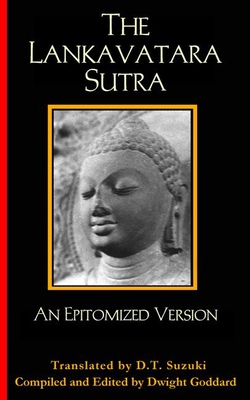

 Provenance Editions
Provenance Editions
The Lankavatara Sutra: An Epitomized Version


Key Metrics
- Daisetz Teitaro Suzuki
- Provenance Editions
- Hardcover
- 9780972635745
- 8.42 X 5.04 X 0.69 inches
- 0.68 pounds
- Religion > Buddhism - General (see also Philosophy - Buddhist)
- English
 Secure Transaction
Secure TransactionBook Description
The Lankavatara Sutra, according to tradition, contains the actual words of the Buddha spoken in Sri Lanka (Ceylon). Nothing is known about its author, the time of its composition, or its original form. Scholars have tended to date the original compilation to early in the first century, and the written work to the fourth century of the Common Era. The sutra was foundational in establishing the central tenets of Mahayana Buddhism, and especially Zen. The Lankavatara was virtually unknown in the West until D. T Suzuki's Studies in the Lanakavata Sutra was published in 1929. Suzuki's subsequent translation and publication of the The Lankavatara Sutra in 1932 earned him the respect and gratitude of scholars and Buddhists worldwide. Professor Suzuki felt that an editing of the Lankavatara, for the sake of easier reading, would make the sutra more widely accessible. He encouraged the editor Dwight Goddard to take on the challenge, and the publication of the 'epitomised' version appeared in print also in 1932, under the title, Self-Realization of Noble Wisdom: The Lankavatara Sutra.
Daisetz Teitaro Suzuki was a renowned Buddhist scholar largely responsible for the popularity of Buddhism in the West. He was born in 1870 in North Japan. As a disciple to Zen masters at Engakuji Monastery in Kamakura, he received the name Daisetz (great humility) as a mark of enlightenment. He wrote over twenty books in English, and a similar number in Japanese. He lectured and taught in the United States, Europe and Japan. He died in 1966.
Dwight Goddard was a pivotal figure in early American Zen Buddhism. Born in Worcester, Massachusetts in 1861, Goddard was an industrial engineer who made his fortune with the US government during WW1. Disillusioned with the war, he subsequently became a missionary, sent first to China, and later to Japan, where he lived in and studied at a Zen Buddhist monastery outside Kyoto for a year. After his return to the States in 1924, he began writing books on Buddhism. He wrote and edited nine titles, among them, The Buddhist Bible, a work credited with influencing the views of Jack Kerouac and other Beat Generation authors.
John Daido Loori is the abbot of Zen Mountain Monastery in Mt. Tremper, New York and the author of many books on Buddhism. Trained in koan Zen as well as in the subtle school of Master Dogen's Zen, he is a dharma heir of Hakuyu Taizan Maezumi Roshi. He has received transmission in both the Rinzai as well as Soto lines of Zen Buddhism.
Author Bio
Daisetz Teitaro Suzuki (1870-1966) was a Japanese translator, teacher, and constructive interpreter of Zen Buddhist thought to the West.
Choosing belief over doubt has profound, eternal consequences for practicing Christians, while for religious Jews and Moslems alike, faith in God is the cornerstone of righteousness. Yet elsewhere in the world, revered spiritual traditions exist in which the struggle between belief and unbelief is of little importance. Daisetz Teitaro Suzuki is an eloquent international spokesman for one of these traditions: the Japanese variant of Buddhism known as Zen.
A widely traveled Japanese scholar, Suzuki taught in that country's university system, translated several Eastern philosophical works into English, and corresponded widely with Christian contemplatives such as Thomas Merton. Through his books and lectures, Suzuki became Zen's leading voice in America during the mid-20th century. His Introduction to Zen Buddhism, published in 1956, not only offers an overview of the historical background of Zen philosophy and practice, but succeeds in conveying something of its seemingly inexpressible essence.
Source: Pbs.org and Encyclopedia.com
Videos
No Videos
Community reviews
Write a ReviewNo Community reviews